كيفية استيراد ملفات نصية متعددة من مجلد إلى ورقة عمل واحدة؟
على سبيل المثال، لديك هنا مجلد يحتوي على عدة ملفات نصية، وما تريد القيام به هو استيراد هذه الملفات النصية إلى ورقة عمل واحدة كما هو موضح في لقطة الشاشة أدناه. بدلًا من نسخ الملفات النصية واحدة تلو الأخرى، هل هناك أي حيل لاستيراد الملفات النصية بسرعة من مجلد واحد إلى ورقة واحدة؟
استيراد ملفات نصية متعددة من مجلد واحد إلى ورقة واحدة باستخدام VBA
استيراد ملف نصي إلى الخلية النشطة باستخدام Kutools لـ Excel ![]()
استيراد ملفات نصية متعددة من مجلد واحد إلى ورقة واحدة باستخدام VBA
إليك كود VBA يمكن أن يساعدك في استيراد جميع الملفات النصية من مجلد معين إلى ورقة جديدة.
1. قم بتفعيل المصنف الذي تريد استيراد الملفات النصية إليه، واضغط على مفاتيح Alt + F11 لفتح نافذة Microsoft Visual Basic for Applications.
2. انقر فوق إدراج > وحدة نمطية، ثم انسخ والصق كود VBA أدناه في نافذة الوحدة النمطية.
VBA: استيراد ملفات نصية متعددة من مجلد واحد إلى ورقة واحدة
Sub Test()
'UpdatebyExtendoffice6/7/2016
Dim xWb As Workbook
Dim xToBook As Workbook
Dim xStrPath As String
Dim xFileDialog As FileDialog
Dim xFile As String
Dim xFiles As New Collection
Dim I As Long
Set xFileDialog = Application.FileDialog(msoFileDialogFolderPicker)
xFileDialog.AllowMultiSelect = False
xFileDialog.Title = "Select a folder [Kutools for Excel]"
If xFileDialog.Show = -1 Then
xStrPath = xFileDialog.SelectedItems(1)
End If
If xStrPath = "" Then Exit Sub
If Right(xStrPath, 1) <> "\" Then xStrPath = xStrPath & "\"
xFile = Dir(xStrPath & "*.txt")
If xFile = "" Then
MsgBox "No files found", vbInformation, "Kutools for Excel"
Exit Sub
End If
Do While xFile <> ""
xFiles.Add xFile, xFile
xFile = Dir()
Loop
Set xToBook = ThisWorkbook
If xFiles.Count > 0 Then
For I = 1 To xFiles.Count
Set xWb = Workbooks.Open(xStrPath & xFiles.Item(I))
xWb.Worksheets(1).Copy after:=xToBook.Sheets(xToBook.Sheets.Count)
On Error Resume Next
ActiveSheet.Name = xWb.Name
On Error GoTo 0
xWb.Close False
Next
End If
End Sub3. اضغط F5 لعرض مربع حوار، واختر المجلد الذي يحتوي على الملفات النصية التي تريد استيرادها. انظر لقطة الشاشة: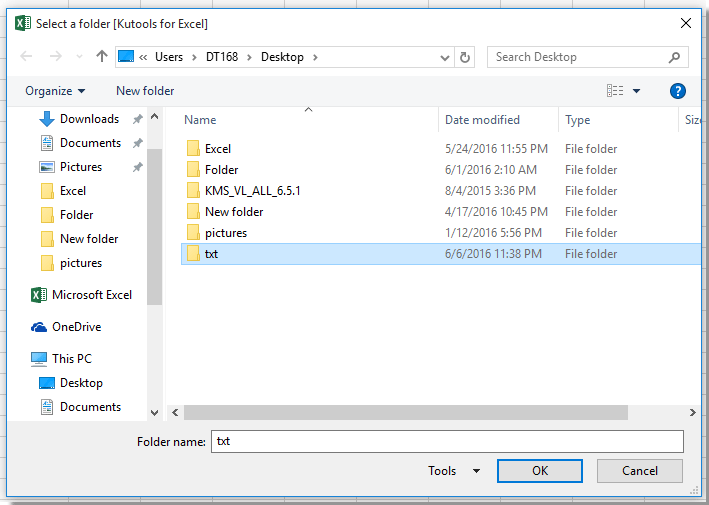
4. انقر موافق. بعد ذلك سيتم استيراد الملفات النصية إلى المصنف النشط كأوراق جديدة بشكل منفصل.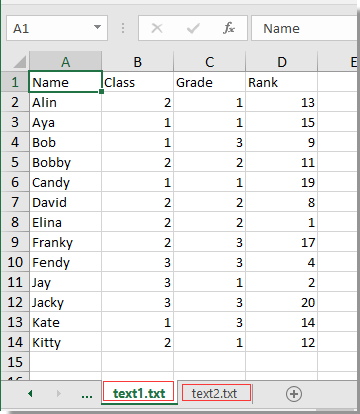
استيراد ملف نصي إلى الخلية النشطة باستخدام Kutools لـ Excel
إذا كنت ترغب في استيراد ملف نصي واحد إلى خلية أو نطاق معين، يمكنك استخدام أداة إدراج ملف في المؤشر من Kutools لـ Excel.
بعد تثبيت Kutools لـ Excel مجانًا ، يرجى القيام بما يلي:
1. حدد الخلية التي تريد استيراد الملف النصي إليها، وانقر Kutools Plus > استيراد/تصدير > إدراج ملف في المؤشر. انظر لقطة الشاشة: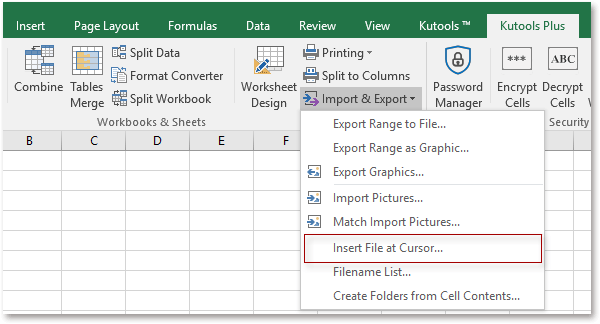
2. بعد ذلك سيظهر مربع حوار، انقر تصفح لعرض حدد ملفًا ليتم إدراجه عند موضع مؤشر الخلية، بعد ذلك حدد ملفات نصية من القائمة المنسدلة، ثم اختر الملف النصي الذي تريد استيراده. انظر لقطة الشاشة: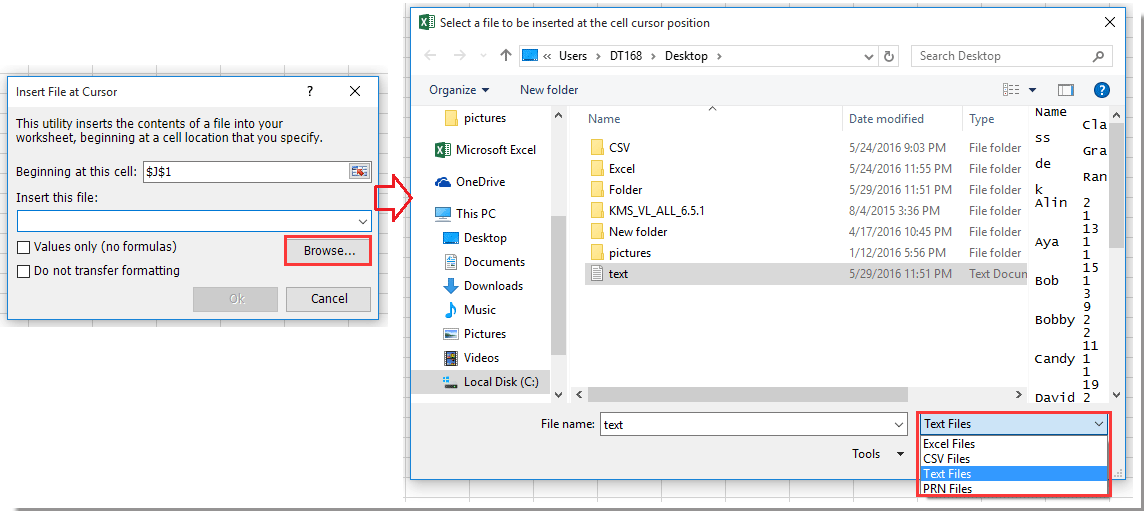
3. انقر فتح > موافق، وسيتم إدراج الملف النصي المحدد في موضع المؤشر، انظر لقطة الشاشة: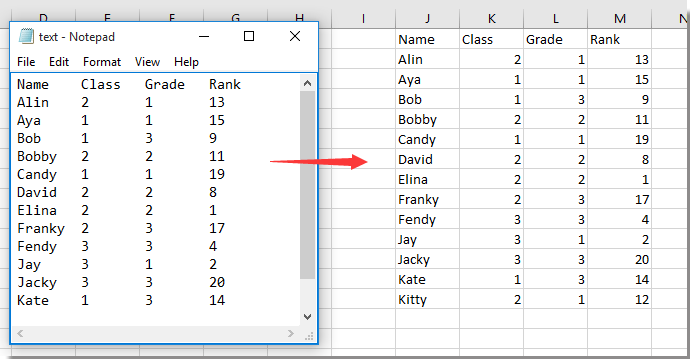
أفضل أدوات الإنتاجية لمكتب العمل
عزز مهاراتك في Excel باستخدام Kutools لـ Excel، واختبر كفاءة غير مسبوقة. Kutools لـ Excel يوفر أكثر من300 ميزة متقدمة لزيادة الإنتاجية وتوفير وقت الحفظ. انقر هنا للحصول على الميزة الأكثر أهمية بالنسبة لك...
Office Tab يجلب واجهة التبويب إلى Office ويجعل عملك أسهل بكثير
- تفعيل تحرير وقراءة عبر التبويبات في Word، Excel، PowerPoint، Publisher، Access، Visio وProject.
- افتح وأنشئ عدة مستندات في تبويبات جديدة في نفس النافذة، بدلاً من نوافذ مستقلة.
- يزيد إنتاجيتك بنسبة50%، ويقلل مئات النقرات اليومية من الفأرة!
جميع إضافات Kutools. مثبت واحد
حزمة Kutools for Office تجمع بين إضافات Excel وWord وOutlook وPowerPoint إضافة إلى Office Tab Pro، وهي مثالية للفرق التي تعمل عبر تطبيقات Office.
- حزمة الكل في واحد — إضافات Excel وWord وOutlook وPowerPoint + Office Tab Pro
- مثبّت واحد، ترخيص واحد — إعداد في دقائق (جاهز لـ MSI)
- الأداء الأفضل معًا — إنتاجية مُبسطة عبر تطبيقات Office
- تجربة كاملة لمدة30 يومًا — بدون تسجيل، بدون بطاقة ائتمان
- قيمة رائعة — وفر مقارنة بشراء الإضافات بشكل منفرد